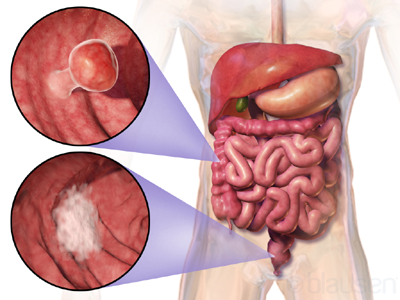How Coffee Can Control Bowel Cancer:- Bowel cancer, also known as colorectal cancer, is a type of cancer that begins in the large intestine (colon) or the rectum. It’s one of the most common cancers worldwide, but early detection and treatment can significantly improve outcomes. Here’s what you need to know about bowel cancer:

Symptoms:
- Change in Bowel Habits: Persistent diarrhea or constipation.
- Blood in Stool: Bright red or very dark blood in the stool.
- Abdominal Discomfort: Cramping, bloating, or pain in the abdomen.
- Unexplained Weight Loss: Significant weight loss without any known reason.
- Fatigue: Feeling tired or weak without any obvious cause.
- Unexplained Anemia: A decrease in red blood cells, often manifesting as fatigue or weakness.
Risk Factors:
- Age: The risk of bowel cancer increases with age, with most cases occurring in people over 50.
- Family History: Having close relatives (parents, siblings) who have had bowel cancer increases your risk.
- Polyps: Certain types of polyps in the colon can develop into cancer over time.
- Inflammatory Bowel Disease: Conditions such as Crohn’s disease or ulcerative colitis can increase the risk.
- Unhealthy Lifestyle: Factors like smoking, excessive alcohol consumption, obesity, and a diet high in red or processed meats can elevate your risk.
- Lack of Physical Activity: Being physically inactive can increase the likelihood of developing bowel cancer.
Prevention:
- Screening: Regular screening tests, such as colonoscopies, can help detect bowel cancer early when it’s most treatable.
- Healthy Lifestyle: Adopting a balanced diet rich in fruits, vegetables, and whole grains, along with regular exercise, can lower your risk.
- Limit Alcohol and Avoid Smoking: Limit alcohol consumption and avoid smoking to reduce your risk of developing bowel cancer.
- Maintain a Healthy Weight: Aim to maintain a healthy weight through a combination of diet and exercise.
- Know Your Family History: If you have a family history of bowel cancer, talk to your doctor about your screening options and frequency.
Treatment:
- Surgery: The primary treatment for bowel cancer involves surgical removal of the tumor and surrounding tissue.
- Chemotherapy: Chemotherapy may be recommended before or after surgery to destroy cancer cells and reduce the risk of recurrence.
- Radiation Therapy: In some cases, radiation therapy may be used to shrink tumors before surgery or to destroy any remaining cancer cells after surgery.
- Targeted Therapy: Certain drugs target specific abnormalities in cancer cells, helping to slow or stop their growth.
- Immunotherapy: This treatment uses the body’s immune system to help fight cancer cells and is sometimes used in advanced cases of bowel cancer.
How Coffee Can Control Bowel Cancer
While coffee consumption has been associated with various health benefits, including a potential protective effect against certain types of cancer, such as bowel cancer, it’s essential to understand the mechanisms behind these effects and the current state of scientific research.
- Antioxidants: Coffee is rich in antioxidants, such as chlorogenic acids and melanoidins, which help protect cells from damage caused by free radicals. Free radicals are unstable molecules that can lead to oxidative stress and contribute to the development of cancer. Antioxidants help neutralize these harmful molecules, potentially reducing the risk of cancer.
- Anti-inflammatory Properties: Chronic inflammation has been linked to the development of various cancers, including bowel cancer. Some compounds found in coffee, such as caffeine and polyphenols, possess anti-inflammatory properties, which may help reduce inflammation in the colon and lower the risk of cancer development.
- Modulation of Gut Microbiota: Emerging research suggests that coffee consumption may influence the composition and activity of the gut microbiota, the community of microorganisms living in the digestive tract. A balanced and diverse gut microbiota is associated with better overall health and a reduced risk of diseases, including cancer. Coffee’s impact on gut microbiota may contribute to its potential protective effect against bowel cancer.
- Improved Bowel Function: Regular consumption of coffee has been associated with improved bowel function, including increased bowel movements and reduced risk of constipation. A healthy digestive system may help lower the risk of bowel cancer by promoting the efficient elimination of waste and reducing exposure of the colon to harmful substances.
- Insulin Sensitivity: Some studies suggest that coffee consumption may improve insulin sensitivity and reduce the risk of insulin resistance and type 2 diabetes. Since insulin resistance and high blood sugar levels are associated with an increased risk of certain cancers, including bowel cancer, maintaining optimal insulin sensitivity through coffee consumption may indirectly contribute to cancer prevention.

While the exact amount of coffee needed to reduce the risk of bowel cancer is not well-defined, some studies have suggested that moderate consumption may be beneficial. In general, moderate coffee consumption is considered to be around 3-5 cups per day. However, individual responses to coffee consumption may vary based on factors such as genetics, overall diet, lifestyle, and other environmental factors
Conclusion:
Bowel cancer is a significant health concern, but it’s also highly preventable and treatable, especially when detected early. Being aware of the symptoms, understanding your risk factors, and undergoing regular screenings are crucial steps in preventing and managing this disease. If you experience any concerning symptoms or have a family history of bowel cancer, don’t hesitate to consult with your healthcare provider for guidance and support.
It’s important to note that while observational studies have suggested a potential link between coffee consumption and a reduced risk of bowel cancer, more research, including randomized controlled trials, is needed to establish a definitive cause-and-effect relationship. Additionally, individual factors such as genetics, overall diet, lifestyle choices, and other environmental factors play significant roles in cancer development. Therefore, incorporating coffee into a balanced and healthy lifestyle, along with other preventive measures such as regular screenings and a nutritious diet, may contribute to overall health and potentially lower the risk of bowel cancer. As always, consulting with a healthcare professional for personalized advice is recommended.


Hello. And Bye.